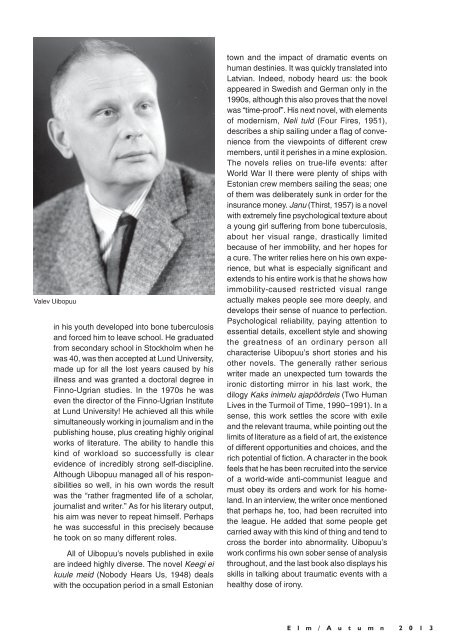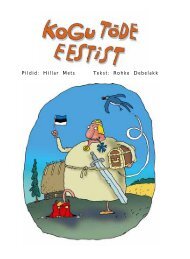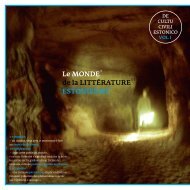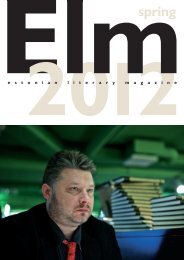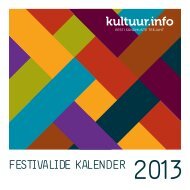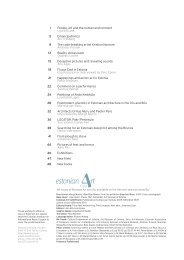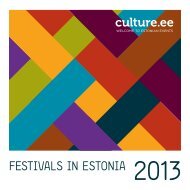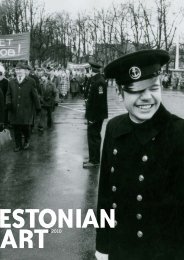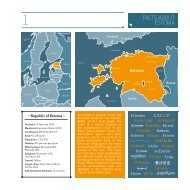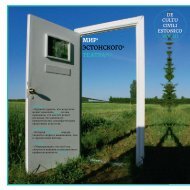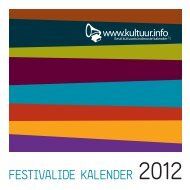Autumn 2013
Autumn 2013
Autumn 2013
You also want an ePaper? Increase the reach of your titles
YUMPU automatically turns print PDFs into web optimized ePapers that Google loves.
Valev Uibopuu<br />
in his youth developed into bone tuberculosis<br />
and forced him to leave school. He graduated<br />
from secondary school in Stockholm when he<br />
was 40, was then accepted at Lund University,<br />
made up for all the lost years caused by his<br />
illness and was granted a doctoral degree in<br />
Finno-Ugrian studies. In the 1970s he was<br />
even the director of the Finno-Ugrian Institute<br />
at Lund University! He achieved all this while<br />
simultaneously working in journalism and in the<br />
publishing house, plus creating highly original<br />
works of literature. The ability to handle this<br />
kind of workload so successfully is clear<br />
evidence of incredibly strong self-discipline.<br />
Although Uibopuu managed all of his responsibilities<br />
so well, in his own words the result<br />
was the “rather fragmented life of a scholar,<br />
journalist and writer.” As for his literary output,<br />
his aim was never to repeat himself. Perhaps<br />
he was successful in this precisely because<br />
he took on so many different roles.<br />
All of Uibopuu’s novels published in exile<br />
are indeed highly diverse. The novel Keegi ei<br />
kuule meid (Nobody Hears Us, 1948) deals<br />
with the occupation period in a small Estonian<br />
town and the impact of dramatic events on<br />
human destinies. It was quickly translated into<br />
Latvian. Indeed, nobody heard us: the book<br />
appeared in Swedish and German only in the<br />
1990s, although this also proves that the novel<br />
was “time-proof”. His next novel, with elements<br />
of modernism, Neli tuld (Four Fires, 1951),<br />
describes a ship sailing under a flag of convenience<br />
from the viewpoints of different crew<br />
members, until it perishes in a mine explosion.<br />
The novels relies on true-life events: after<br />
World War II there were plenty of ships with<br />
Estonian crew members sailing the seas; one<br />
of them was deliberately sunk in order for the<br />
insurance money. Janu (Thirst, 1957) is a novel<br />
with extremely fine psychological texture about<br />
a young girl suffering from bone tuberculosis,<br />
about her visual range, drastically limited<br />
because of her immobility, and her hopes for<br />
a cure. The writer relies here on his own experience,<br />
but what is especially significant and<br />
extends to his entire work is that he shows how<br />
immobility-caused restricted visual range<br />
actually makes people see more deeply, and<br />
develops their sense of nuance to perfection.<br />
Psychological reliability, paying attention to<br />
essential details, excellent style and showing<br />
the greatness of an ordinary person all<br />
characterise Uibopuu’s short stories and his<br />
other novels. The generally rather serious<br />
writer made an unexpected turn towards the<br />
ironic distorting mirror in his last work, the<br />
dilogy Kaks inimelu ajapöördeis (Two Human<br />
Lives in the Turmoil of Time, 1990–1991). In a<br />
sense, this work settles the score with exile<br />
and the relevant trauma, while pointing out the<br />
limits of literature as a field of art, the existence<br />
of different opportunities and choices, and the<br />
rich potential of fiction. A character in the book<br />
feels that he has been recruited into the service<br />
of a world-wide anti-communist league and<br />
must obey its orders and work for his homeland.<br />
In an interview, the writer once mentioned<br />
that perhaps he, too, had been recruited into<br />
the league. He added that some people get<br />
carried away with this kind of thing and tend to<br />
cross the border into abnormality. Uibopuu’s<br />
work confirms his own sober sense of analysis<br />
throughout, and the last book also displays his<br />
skills in talking about traumatic events with a<br />
healthy dose of irony.<br />
E l m / A u t u m n 2 0 1 3


